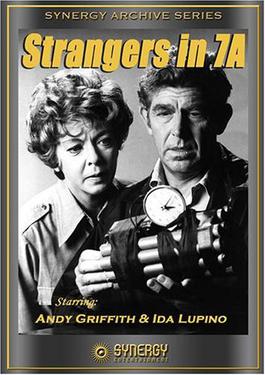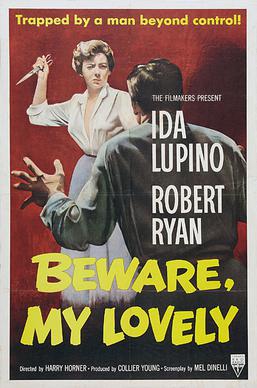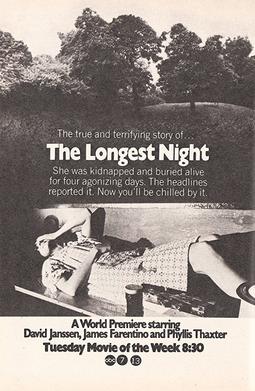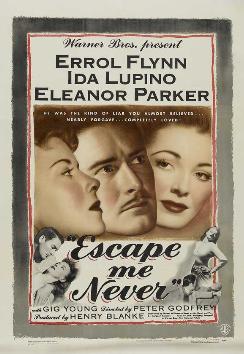
The Hitch-Hiker is a 1953 American independent film noir thriller co-written and directed by Ida Lupino, and starring Edmond O'Brien, William Talman and Frank Lovejoy. Based on the 1950 killing spree of Billy Cook, the film follows two friends who are taken hostage by a murderous hitchhiker during an automobile trip to Mexico.

Eleanor Jean Parker was an American actress and singer. She was nominated for three Academy Awards for her roles in the films Caged (1950), Detective Story (1951), and Interrupted Melody (1955), the first of which won her the Volpi Cup for Best Actress. She was also known for her roles in the films Of Human Bondage (1946), Scaramouche (1952), The Naked Jungle (1954), The Man with the Golden Arm (1955), A Hole in the Head (1959), The Sound of Music (1965), and The Oscar (1966).

Linda Denise Blair is an American actress and activist. Her portrayal of Regan MacNeil in the horror film The Exorcist (1973) established her in popular culture and as a scream queen, earning her a Golden Globe Award, as well as an Academy Award nomination. She reprised the role in two sequels: Exorcist II: The Heretic (1977) and The Exorcist: Believer (2023).

Ida Lupino was a British actress, director, writer, and producer. Throughout her 48-year career, she appeared in 59 films and directed eight, working primarily in the United States, where she became a citizen in 1948. She is widely regarded as the most prominent female filmmaker working in the 1950s during the Hollywood studio system. With her independent production company, she co-wrote and co-produced several social-message films and became the first woman to direct a film noir, The Hitch-Hiker, in 1953.
The women in prison film is a subgenre of exploitation film that began in the early 20th century and continues to the present day.

Howard Green Duff was an American actor.

Sally Forrest was an American film, stage and TV actress of the 1940s and 1950s. She studied dance from a young age and shortly out of high school was signed to a contract by Metro-Goldwyn-Mayer.

The Strangers in 7A is a 1972 American made-for-television thriller drama film directed by Paul Wendkos and starring Andy Griffith, Ida Lupino, and Michael Brandon. It is based on the 1971 novel of the same title by Fielden Farrington and originally aired on CBS on November 14, 1972.

Beware, My Lovely is a 1952 American crime film noir directed by Harry Horner starring Ida Lupino, Robert Ryan and Taylor Holmes. The film is based on the 1950 play The Man by Mel Dinelli, who also wrote the screenplay.
Trinidad "Trini" Alvarado is an American actress best known for her performances as Margaret "Meg" March in the 1994 film adaptation of Louisa May Alcott's novel Little Women and Lucy Lynskey in the comedy horror film The Frighteners. She also has had notable stage performances and singing roles in musicals.

The Man I Love is a 1947 American film noir melodrama directed by Raoul Walsh and starring Ida Lupino, Robert Alda, Andrea King and Bruce Bennett. Produced and distributed by Warner Brothers, the film is based on the novel Night Shift by Maritta M. Wolff. The title is taken from the George and Ira Gershwin song "The Man I Love", which is prominently featured.

Stanley Richard Lupino Hook, known professionally as Stanley Lupino, was an English actor, dancer, singer, librettist, director and short story writer. During the 1930s, Lupino appeared in a successful series of musical comedy films, often based on his already popular stage shows.

The Longest Night is a 1972 American made-for-television drama film written by Merwin Gerard and directed by Jack Smight. This movie was originally shown as an ABC Movie of the Week on September 12, 1972. It is based on the 1968 Barbara Mackle kidnapping by Gary Steven Krist.

Hard, Fast and Beautiful is a 1951 American drama film directed by Ida Lupino and starring Claire Trevor. It is loosely based on the 1930 novel American Girl by sports-fiction author John R. Tunis, which was an unflattering and thinly veiled fictionalization of the life of the tennis star Helen Wills Moody.

The Hard Way is a 1943 Warner Bros. musical drama film starring Ida Lupino, Dennis Morgan, and Joan Leslie. Directed by Vincent Sherman, it is based on a story by Irwin Shaw which was reportedly based on Ginger Rogers' relationship with her first husband Jack Pepper and her mother Lela.
Maybe I'll Come Home in the Spring is a 1971 American made-for-television drama film directed by Joseph Sargent and starring Sally Field, Eleanor Parker, Jackie Cooper, Lane Bradbury and David Carradine. The film premiered as the ABC Movie of the Week on February 16, 1971.

Never Fear, also known as The Young Lovers, is a 1950 American drama film directed and co-written by Ida Lupino, and produced by Lupino and Collier Young. It stars Sally Forrest, Keefe Brasselle, and Hugh O'Brian.

Escape Me Never is a 1947 American melodrama film directed by Peter Godfrey, and starring Errol Flynn, Ida Lupino, Eleanor Parker, and Gig Young.

Ready for Love is a 1934 American romantic comedy film directed by Marion Gering and presented by Adolph Zukor for Paramount Pictures. It stars Richard Arlen, Ida Lupino, and Marjorie Rambeau. It is inspired by the play The Whipping by Eulalie Spence, based on the 1930 novel The Whipping by Roy Flanagan. The film is about school runaway Marigold Tate who "journeys to her retired aunt's home where she soon faces small-town bigotry", and falls in love with handsome newspaper editor Julian Barrow.

Not Wanted is a 1949 American drama film directed by Elmer Clifton and an un-credited Ida Lupino and starring Sally Forrest, Keefe Brasselle and Leo Penn.

















